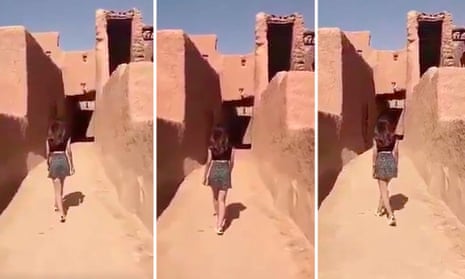A woman who appeared in videos touring one of Saudi Arabia’s heritage sites dressed in a skirt and crop top is being investigated by the kingdom’s religious police.
The woman, who is identified as Khulood, appeared in a series of clips on Snapchat over the weekend at the deserted Ushaqir heritage village in the religiously conservative province of Najd, about 100 miles (160km) north of the capital, Riyadh.
In a statement marked urgent on Tuesday, the general directorate of public security said the woman had been questioned by police while investigations continue. It said it had been monitoring the videos under laws aimed at tackling “information crimes”.
To westerners, her outfit is that of a typical summer tourist – sunglasses, a short skirt, short T-shirt and her head uncovered. But it breaches Saudi Arabia’s strict dress code requiring women to wear headscarves and abayas (full-length robes) in public. Most also cover their face with a black veil, though exceptions are made for visiting dignitaries.
The videos, filmed in a region home to many of Saudi Arabia’s most conservative tribes and families, appeared to be a deliberate protest against clothing rules and has prompted calls for the woman to be prosecuted. But according to Saudi news agencies the woman has told the authorities that the videos were posted without her knowledge.
Versions of the videos went viral on YouTube, Facebook and Twitter amid a furious debate about dress and the treatment of women in Saudi Arabia.
The woman apparently told police that she had been accompanied by a male relative – or muharam – at all times during her visit, in accordance with Saudi’s male guardianship system. She confirmed she had appeared in the videos, but insisted she did not post the clips herself.Saudi Arabia’s religious police, the Committee for the Promotion of Virtue and the Prevention of Vice, said they were also investigating.
Their official Twitter feed said they were aware of the video and in contact with the relevant authorities.
المتحدث باسم #هيئة_الأمر_بالمعروف بـ #الرياض: الرئاسة رصدت مقطع لفتاة بلباسٍ مخالف، وجرى التنسيق مع الجهات المختصة.https://t.co/WCZBqLN2e8 pic.twitter.com/rD78JeAgUa
— رئاسة الهيئة (@PvGovSa) July 16, 2017
The Saudi news website Sabq reported that the religious police have written to other agencies calling for an investigation into the “indecently” dressed woman.
The woman’s actions prompted abusive backlash online. Since the incident the issue has been trending on Twitter under the hashtag “demand the trial of model Khulood”.
The Saudi writer Ibrahim al-Munayif told his 41,000 Twitter followers that if everyone disregarded the law in this way there would be chaos.
“Just like we call on people to respect the laws of countries they travel to, people must also respect the laws of this country,” he wrote.
#مطلوب_محاكمه_مودل_خلود لأن تصرفها همجي!
— إبراهيم المنيف (@altamimi14) July 16, 2017
لازم تحترم القانون اعجبك او ما اعجبك!
>لو كل واحد تمرد على القانون لأنه مو عاجبه، بتصير الدعوة فوضى pic.twitter.com/f7k294gWlc
But the woman’s actions have also been fiercely defended online. Many have pointed out that during Donald Trump’s visit to Saudi in May his wife, Melania, and daughter Ivanka chose not to wear headscarves in public.
Others have suggested Saudi society must accept infringements of its dress codes if it is to attract more tourists as envisaged under crown prince Mohammed bin Salman’s strategy for the future – or Vision 2030.
Amal al-Hazzani, an academic and writer, wrote: “Let’s suppose this is an Italian tourist who wanted to know about our great past as part of our 2030 vision of not relying only on oil. Get use to that.”
Social media are wildly popular in Saudi Arabia as a space to vent frustrations and gauge public opinion.
With more than half of the population of Saudi Arabia under 25, Salman, the country’s 31-year-old heir to the throne, has pushed for greater freedom of entertainment, in part to appease young people, but strict gender segregation rules and other restrictions on women’s movements remain in place.
Rothna Begum, a women’s rights researcher on the Middle East at Human Rights Watch, said any attempt to arrest the woman in the video would be a violation of her right to freedom of expression.
In an email to the Guardian, she said: “The dress code and strict segregation in Saudi Arabia affects women across the kingdom, including in their right to work.”
Companies can face fines if they do not segregate offices and enforce a strict dress code for women, including a mandatory hijab, which often means they are more reluctant to hire women. Women who do not abide by the dress code in offices can be fined 1,000 riyals (£205).
“Such restrictions come on top of the notorious male guardianship system in which, from birth until death, a woman must have a male guardian – a father, husband, brother or even a son – who has the power to make a range of critical decisions on her behalf,” Begum said.
In April, Salman ordered all government agencies to allow women to access any government services without a male guardian’s consent unless existing regulations require it. Government agencies had until last weekend to produce a list procedures that would now require male guardian approval. Human rights campaigners urged Saudi Arabia to use the move as an opportunity to ditch all guardianship rules for women.










